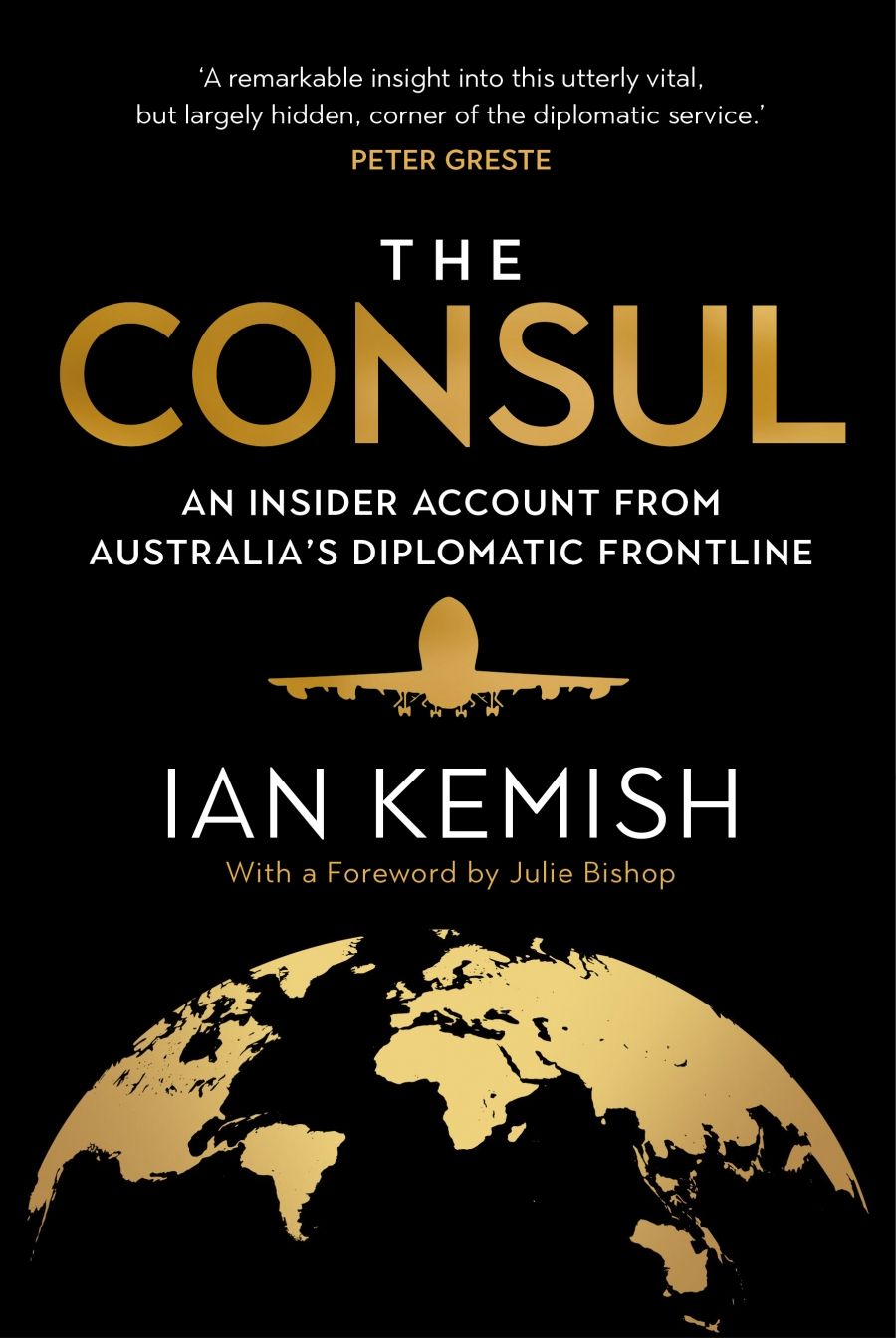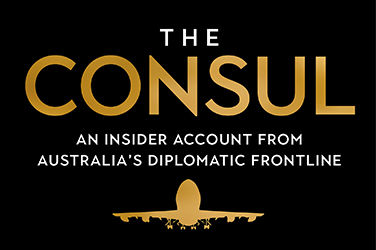
- Free Article: No
- Contents Category: Memoir
- Review Article: Yes
- Article Title: Cons, ops, and con-ops
- Article Subtitle: An engrossing diplomatic memoir
- Online Only: No
- Custom Highlight Text:
When Australians working in diplomatic posts share anecdotes, the best usually come from the consuls. They recount travellers’ tales of love and loss, dissipation and disaster, adventure and misadventure from Australians perpetually on the move – at least until the pandemic. It’s the consuls’ job to help those who are injured, robbed, kidnapped, arrested, or otherwise distressed abroad.
- Featured Image (400px * 250px):

- Alt Tag (Featured Image): Alison Broinowski reviews 'The Consul' by Ian Kemish
- Book 1 Title: The Consul
- Book 1 Biblio: University of Queensland Press, $32.99 pb, 287 pp
- Book 1 Readings Link: https://www.booktopia.com.au/the-consul-ian-kemish/book/9780702263491.html
Still, these disasters befell only a small proportion of Australian travellers, and the innocent far outnumbered the guilty. Kemish recalls a young solo mountaineer whose gear became snagged on a rock shelf above the Mediterranean. The climber promptly used his mobile phone to call his mother in Australia; she rang 000; the operator contacted the Consular Emergency Centre (CEC) in Canberra; and in little over an hour he was winched to safety. Another Australian failed for days to answer repeated calls to his mobile from the consular staff after the 2002 Bali bombing. Eventually he did and explained that he had just gone on with his trip. One of Kemish’s colleagues advised the traveller’s worried family in Australia, and suggested he do the same. Ironically, this was shortly after the consular service had been urged by a Senate committee to pay closer attention to travellers’ Australian relatives.
When the modern age of terror began in the 1990s, Kemish admits that Australia’s consular service was a mere cottage industry, staffed mainly by middle-aged men. Al Qaeda’s precursor had attacked Americans in New York, Yemen, Kenya, and Tanzania. Australia made itself an enemy of Al Qaeda and of its Indonesian offshoot, Jemaah Islamiyah, first by supporting the independence of East Timor in 1999 and then by sending troops to Afghanistan. That was when Kemish took over the Consular Branch in DFAT and responsibility for ‘con-ops’ in some 100 overseas posts, where case numbers would double over the next two decades.
Responding to terrorism became a ‘con-op’ on 9/11, when ten Australians died in the World Trade Center, and then again in Bali in 2002, with eighty-eight more Australian deaths. The Kuta nightclub bombing set off a telephone blitz at CEC, which took 10,000 calls in the first twenty-four hours. Further attacks followed in Jakarta at the Marriott Hotel and the Australian Embassy.
Some Australian commentators couldn’t understand why Australia was targeted, but the terrorists spelt it out at their trial. It was clear, too, to Brian Deegan, an Adelaide magistrate whose son had died in Bali. He wrote an open letter to Prime Minister John Howard linking the bombing to Australia’s part in the War on Terror. Kemish, appointed and promoted under the Howard government, assured Deegan that DFAT had no intelligence in advance of the bombing. Deegan was unconvinced by him and by Foreign Minister Alexander Downer.
When a tsunami hit Indonesia on Boxing Day 2004, Kemish and the CEC entered the age of experience. Learning how to respond better with each disaster, they quickly recruited hundreds of staff from elsewhere in DFAT, as well as getting RAAF aircraft and troops from the ADF deployed. The consuls were on the ground again offering help after another tsunami, together with an earthquake and nuclear meltdown, struck Fukushima in 2011. To some in Canberra, the consular service seemed to have entirely taken over DFAT.
Experience wasn’t confined to these or other catastrophes. Kemish lists the Australians abducted, murdered, or imprisoned over these two decades, in Cambodia, China, Iraq, Myanmar, and Somalia – despite DFAT’s travel warnings. He expressesparticular concern about the two years of imprisonment for alleged espionage that Dr Kylie Moore-Gilbert endured in Iran, and that Peter Greste did in Egypt, and celebrates their release after protracted negotiations. He applies a ‘sense of social justice’ to the cases of David Hicks and Mamdouh Habib, who were both sent to Guantánamo Bay, and recalls that the consuls put their ‘hearts and souls’ into ensuring Habib’s welfare.
It says something about social justice that Kemish should choose former Foreign Minister Julie Bishop to write the foreword and former journalist Peter Greste to contribute a blurb for this book. Both are on the record as critics of Julian Assange. Despite claims by Bishop’s successor, Marise Payne, that consular assistance was repeatedly offered to Assange, it did not reach the ‘hearts and souls’ standard. Kemish admits that it was basic. But both major Australian parties, he writes, agreed that regardless of the international campaign for Assange, British justice should prevail. (US justice remains to be seen.) Apparently, much depends on which government imprisons which Australian. Sitting apolitically on the fence, Kemish repeats the well-rehearsed ‘thief and traitor versus whistleblower and journalist’ argument. Now, however, with a new government in Canberra, he speculates that many Australians think Assange has suffered enough.
Bishop’s foreword asserts: ‘Australia’s consular service is among the best in the world.’ Ian Kemish modestly and scrupulously records the significant part he and others played in improving it, in preparation for disasters to come.


Comments powered by CComment